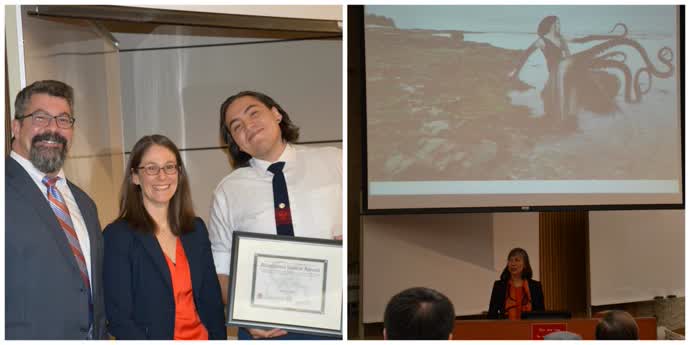
L: Indigenous Law Students' Association representative Emma Banfield and Dean Paton pose with Caleb Behn, recipient of ILSA's 2017 Aboriginal Justice Award.
R: Terri-Lynn Williams-Davidson concluded the 2017 Aboriginal Law Speaker Series on March 10.
March 9 and 10 marked the final two days of the Indigenous Law Students' Association's (ILSA) annual Aboriginal Law Speaker Series, a four-day event that saw four experts - including three lawyers - share their knowledge with students and members of the public on the broad topic of consultation in environmental legal issues.
On March 9, Caleb Behn, a First Nations lawyer from northeast BC, spoke on the duty to consult, reconciliation, and the history of environmental issues with respect to indigenous lands.
Behn began by providing an overview and criticism of reconciliation and the duty to consult. Behn contends that reconciliation is structured to fail, but if done appropriately, it might help us respond to global climate change. He also made the case that the duty to consult isn't practical because its principles don't translate in real life.
During his presentation, Behn distinguished between legal and social reconciliations, before delving into the legal evolution of indigenous / settler relations, starting with the colonial era all the way to the reconciliation era today. He also distinguished the two sides of Aboriginal law - advocacy and engagement.
Behn concluded his presentation on a personal note, showing maps that outline his Treaty 8 home vis a vis the progression of fracking over time, both before the duty to consult was implemented, and after. He also discussed his own family's experiences with a case that went to the Supreme Court and talked about upcoming projects related to the potential health impacts of resource development projects.
Before the Q&A portion, Behn encouraged audience members to make up their own minds about the duty to consult, and emphasized his belief that true reconciliation isn't about cultures, but about recognizing connections with the outside world - whether you agree with them or not.
The final day of the speaker series saw a presentation from Terri-Lynn Williams-Davidson on "Consultation in Environmental Legal Issues: The Haida Approach."
Williams-Davidson, a citizen of the Haida Nation where she serves as General Counsel, began the presentation by giving an overview of the history of Haida lands and the related challenges she has taken to all levels of the court - including the TFL39 Case, the Supreme Court of Canada's leading case on consultation and accommodation of Aboriginal rights related to resource development.
Williams-Davidson spoke positively about the progress she has made in protecting land under federal and provincial law, but noted that various challenges still exist today, including overexploitation and the need for sustainability.
A large part of Williams-Davidson's presentation focused on wildlife: whether on land or in the sea, in the Haida view, there is no separation between the two. Maps she displayed helped to illustrate all of the various types of wildlife that can be found in the area she calls home.
Williams-Davidson concluded her presentation by telling students that it is possible to work in an area of the law that you love, and solely in that area, for the duration of your career. She said it's also possible to honour the teachings of Elders, bring them to court, and even have them upheld.
Aboriginal Justice Award
Each year during the Aboriginal Law Speaker Series - generously sponsored by the Alberta Law Foundation and ATCO - ILSA also presents its Aboriginal Justice Award. This year's recipient was Caleb Behn. Behn, who is Eh-Cho Dene and Dunne Za/Cree, received the award for his work in environmental law and sustainability.
Dean Paul Paton was on hand for the March 9 award presentation and Behn's lecture. He provided opening remarks about UAlberta Law's commitment to ensuring that students enter the legal profession with knowledge of Indigenous laws and legal traditions, a firm understanding of the application of Canadian law to Indigenous peoples, and the skills to interact with respect and understanding with people from a variety of Indigenous societies.
"This information is important for students to learn early on so that - as the next generation of Canadian lawyers - all are well equipped to serve Indigenous clients and communities in all areas of the law with respect and sensitivity," he said.
"We need to learn about and understand these issues, both for our own legal competency - as law students, you will encounter these issues in whichever aspect of the law you choose to practice, whether in family, energy and resource development, criminal, or any other branch of the law - but also because of our responsibility as officers of the court and our role in Canadian society."
Dean Paton added that, in recent years, UAlberta Law has undertaken initiatives designed to create a more supportive learning environment for Indigenous students, and to increase opportunities for all students, faculty, and staff to further develop their awareness and understanding of the perspectives of Indigenous peoples as related to the law. He concluded by saying that the Faculty has benefited greatly in these endeavors from the expertise of Professor Catherine Bell and Assistant Professor Hadley Friedland, and that the Faculty is proud to provide funding to support ILSA to assist with its important program of activities and supports, including the Aboriginal Law Speaker Series.